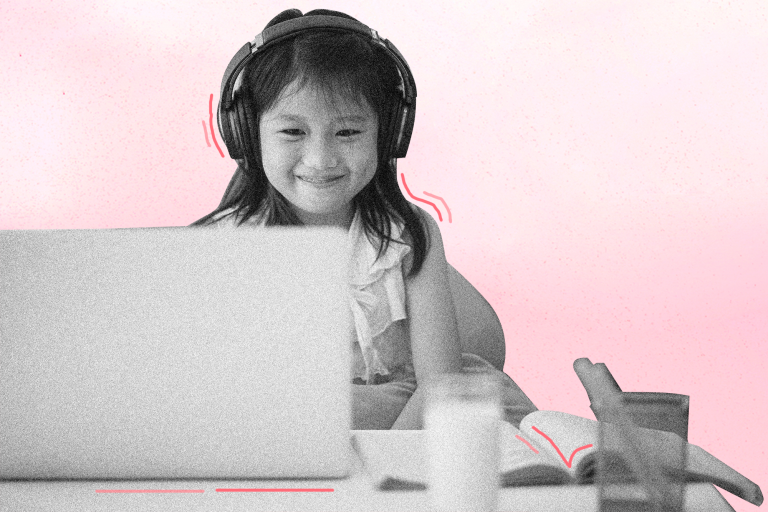Parenting(Age 5 to 8) | Academic | General | Parenting(Age 9 to 12) | Parenting(Age 13 to 16) | Jan 29, 2021
Tips for Parents to Improve the Remote Learning Experience

Now that we are going through strenuous circumstances, we need to prepare and provide support to our kids in their social, emotional, and academic growth during this pandemic. The present situation has forced teachers and students to move a normally in-person class to a temporary online space. Remote learning is not something new and in this phase of the pandemic, parents, caregivers, teachers, and school leaders are better prepared to support kids in their social, emotional, and academic growth. However, the truth is that parents have to handle much more responsibility for their kids’ learning than ever before. Also, in order to make distance learning successful, parents and caregivers need support.
We should remind ourselves that parents are not trained teachers and in these circumstances, we come face to face with the fact about how important teachers really are. Teachers are professionals; they have been trained and have high experience and receive continuing education, all in order to hone a highly skilled craft. If we are mistaken to think that we can fill the gap of a teacher during the pandemic, we are quite reprehensible.
Studies have shown that being forced into an unfamiliar learning experience stimulates fear which is evinced through different ways, such as becoming withdrawn, acting out, crying or being more aggressive than usual. Teachers have years of experience in understanding and figuring out the needs of the kids and help them going. Children are not much worried about the virus, or how the pandemic is affecting their social life, but they do feel it. We as parents and educators should try to lead with love, and remember that strong relationships with kids make for positive educational experiences.
Get Free Parenting Support Now!
Remote learning requires a different level of preparedness. It is a known fact that students benefit from a solid routine in the classroom, and the same is true for remote learning as well. The sudden transitioning of the school learning system to a remote learning environment necessitates long-range strategic planning. It requires allocation of resources, to be focused for sustainable professional development and equitable access to devices and connectivity for students. Keeping in mind the detrimental impact that school closures can have on students’ access to education, all schools rushed to create online learning plans that would ensure educational continuity and keep students engaged in their learning process. The present scenario overburdened the classroom teachers and support professionals with the responsibility of sustaining academic growth and the well-being of the students in the new normal. The teachers and support professionals being committed educators seek to continue using data driven instructions and trying to assess mastery.
They devise learning material based on learning abilities and styles, develop relationships, and care for the emotional and physical well-being of the students. It is understandable that educators are overwhelmed with this crisis-driven model of education, and many of them attempt to replicate the face-to-face classroom experience for their students. However, what can be done in class is not easily duplicated in a virtual one and to recreate the classroom ambiance, some development in remote learning has to take place. There are some steps for the schools to make remote learning enjoyable and help students not to miss the classroom experience. Let’s get down to the details to help parents and caregivers to keep kids focused, interested, and balanced while learning from a distance.
Prepare a learning room
Provide a personalized corner in the room dedicated to learning and let students help prepare themselves a space for school. For younger kids, create a visual schedule that they can follow. Get the kids ready before the remote learning classes begin so that they are not tired and hungry during the learning time. Keep healthy snacks ready for the kids so that they can help themselves to a snack after a lesson and return refreshed. Research has already proved that kids benefit from free play and unstructured time tables. Physical activity and breaks reduces kids’ stress level and increase their readiness to learn. That’s the reason schools have recess and other free choice activities to make the day fun and learning more effective. Check with the educator to make learning more interactive and let the kids feel that even being away from school they are still under the care and guidance of the teacher.
Give weightage to relationship
Now with the changing circumstances, your shifting role from a parent to a learning facilitator and back again increases the risk of endangering the relationship with our children. Keep in mind that if we prove ourselves to be supportive and caring, children will work hard and will follow rules and routines. Keep things light and playful and try to avoid overt power struggles. Advocate teachers’ attempt to bond with kids to make remote learning as social as possible. Moreover we need to remain positive and hopeful because children, mostly little ones, look at us and try to figure out how to react to new or intimidating situations.
Show enthusiasm for your kids learning
As parents we need to nurture our children to success emotionally and this can be achieved by alluding to a willingness to engage, to be social and try to head outside of their comfort zones. Always associate learning to fun; loving to learn and get better at tasks is always something valuable for a child. Help children to understand their worth and praise them for genuine good work with huge encouragement. Plenty of encouragement sometimes do miracle, especially in the face of challenges. We need to understand that children need positive encouragement just like plants need water and sunlight to grow and prosper and we should be their light on their road to success.
Life is making us go through a juggling act, we have to keep on motivating our kids and not just by creating a work space, establishing rules and systems, but by making work meaningful, playing with their strengths, encouraging a growth mindset, and focusing on relationships. We should express a positive attitude towards remote learning so that they feel connected and not lost in the world of uncertainty.
















Post a Comment: